
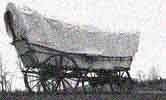
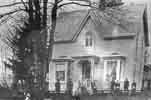
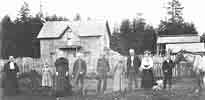
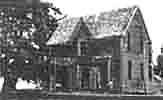
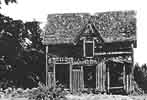
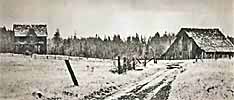
| Home |
| Early Life |
| Maps |
| Oregon Laws |
| The Trail |
| Bush Biography |
| Tumwater Born |
| Thurston County |
| State History |
| Bush
Farm Today |
| FAQs |
| Timeline |
Reminiscences of Ada Sprague Mowell
THE BUSH FAMILY Clinging like the last withered leaf on the tree, only waiting for thepassing breeze to waft him to join his parents and five brothers lives Lewis N.Bush, the youngest son of that hardiest argonaut of them all, George Bush and his faithful wife, Isabella James Bush. The Bush family arrived in what is now known as Thurston County as early as 1845, while this section was an unbroken wilderness and with their party consisting of about thirty people were the very first settlers north of the Columbia River. The original families consisted of the Bush family, father, mother and five sons, William 0., Joseph T., Reilly B., Henry, Sanford and Jackson J.; Mr. and Mrs. M. Simmons with their four sons, Mr. and Mrs. McAllister with their son and two daughters; David and Mrs. Talitha Kindred and their son John K.; the Jones family, consisting of father and mother and sons Lewis and Morris and daughter, Elizabeth and two single men, Samuel Crockett and Jesse Ferguson. When the start was made from the old home in Missouri the elder Bush had laid in a bountiful stock of supplies enough to last him and his own family for several years of frontier life, but all his associates had not been so well equipped and even before the last and final stop was made there was a shortage of necessities among several of the emigrant families. Bush, with the generosity and kind heartedness which was his most marked characteristic, divided with the less fortunate, even to the subsequent deprivation of his own family. Beaching Puget Sound, the families settled on what has ever since been known as Bush Prairie, and took up donation claims of 640 acres to a family. Lewis Bush enjoys the distinction of being the only man living on an original donation claim west of the mountains. In every other instance the original owners of claims have parted with them, but the Bush claims has descended in an unbroken line from the father George Bush, to the youngest, son and to a grandson, Mr. John S. Bush, son of W. O. Bush. The first winter spent on Puget Sound was one to try mens' souls, there was absolutely nothing in the wav of provisions to be bought for love or money. It is true the Hudson Bay Company had a post on the Nesqually with Dr. Tolmie manager, but already there was a feeling of jealousy springing up in the minds of the managers of the company, over the rapidly increasing number of emigrants coming to share the ranges and preempt the fertile land. The agents were forbidden to extend aid to the settlers, so although Dr. Tolmie was inclined to feel kindly towards the newcomers, he was forbidden to openly sell them the necessaries of life. Clams, salmon, game and oysters were the substantial of diet eked out, with a little wheat and dried peas, which still remained of the stores. The settlers learned to eat with relish the roots of ferns which they used as green stuff. Flour there was none until the Simmons mill was finished in Newmarket. The men of the new settlement went right to work building cabins for shelter for their families against the winter weather, which was about to close in on them. The cabins were covered with split shakes and the floors were of puncheon, while the few simple articles of furniture were manufactured from the cedar logs lying in profusion on the ground. Mr. Bush, shortly after his arrival, set out fruit and shade trees the seeds of which he had brought with him from his old home. Many of these trees grew and flourished and stand to this day, noble monuments to the hardy old pioneer. George Bush died in 1863 and his wife a couple of years later. After their deaths the homestead passed into the hand of his three sons, W. O., J. T., and H. S. Bush. In time W. U. Bush married and became the father of the lady who is now Mrs. George Gaston and John Bush. Lewis Bush in speaking of his earlier experiences on the old homestead said: "Yes, those were hard times. We all had to scramble for enough to eat. There was simply nothing we could buy from any market for several years. I remember one summer day an old squaw came to our house with something to eat which she wanted to sell. Mother tried to dicker with her but she only wanted clothes. Money was of no use to her. She wanted a shirt for one of her papooses. Now, we had been away from home a long time and clothing was getting scarce but mother wanted whatever it was the squaw had so badly that she stripped the shirt off of my brother Sanford's back and gave it to the siwash. "I was born on the homestead after the folks reached Bush Prairie, so I cannot remember as well as could my brothers about, the Indian war. I know we were all anxious and worried for several months and when the first scare was on and the red skins had killed McAllister and Northcraft father moved his family into the Fort at Tumwater for a while. But as time went on he was anxious to get back to his place, as were the other settlers of our neighborhood, so they went to work and built a fort of their own on father's farm. "Saplings probably fourteen feet long were cut from the woods and a trench dug several feet deep. In this trench was set upright the saplings in a double row clear around the enclosure. This made a high wall which was practically bullet proof. Inside this enclosure were the cabins of the settlers each by themselves. We were comfortable enough and lived that way for several months. This fort was always known as Bushs' fort. "I was a big lad, probably twelve years old, before I had my first pair of shoes. There were none to be had in all the country, so I was forced to go barefoot, not that I considered that any hardship, for I was used to it and only wanted shoes to put on style with. Well, when the first sailing vessel came into harbor at Olympia, father went on board to see what of the cargo he could buy. There was a whole box of shoes of all sizes among the articles father bought. Of course, the elders had first pick at the shoes and when I had a turn at the box there was only one pair of No. 10s left. They would have been big enough for any large man but I was only toe tickled to get them and wore the shoes with great pride on Sundays and special occasions. Those shoes lasted me for years. "Mother made friends with Dr. Tolmie and it was through him that she got her first start in poultry and sheep. She had traded for a few hens from a French family who were connected with the Hudson Bay Company, and when one of these hens showed her willingness to set, mother got a setting of turkey eggs from Dr. Tolmie. She was very successful with this hatching and by coddling those young turks soon had a nice flock. Dr. Tolmie had not been so lucky with his turkeys so he told mother he would trade her a fine ewe for every turkey she would let him have. She was glad to do so and in that way she got the first start of the large flock of sheep which was one of the greatest sources of profit in a few years. From Dr. Tolmie also we got the first start of hogs. Well, so we lived for years, always getting ahead a little and I am glad to say, always having a little to share with our poorer neighbors. Neither father nor mother could bear to deny anyone who applied to them for assistance." Lewis Bush might have gone on and related how the Bushs, father and sons were always willing and ready to extend a helping hand to the settlers who soon began to pour into the country. The Bush farm was the stopping place between the settlements of Olympia and New Market and the Cowlitz landing and there are still men and women living who can recall being entertained at this home. Night or day the Bushs kept open house to all comers, no one was turned away without being fed and sheltered and in many cases their wagons carried substantial gifts of fruit, garden truck and grain from Mr. Bush's abundant stores. Mr. George H. Himes relates a story about the elder Bush which is given here as being characteristic of the open handed generosity of not only himself but his six sons as well. One year there was a great scarcity of grain. The yield, owing to unfavorable conditions, was unusually small. Seattle by this time was quite a town and speculators from that place came to Mr. Bush and offered him an almost fabulous price for all his harvest. They were astounded when their offer was refused, and were very chagrined over their failure to corner the output of grain. They asked Mr. Bush what he intended doing with his surplus. "I'll just keep my grain to let my neighbors who have had failures have enough to live on and for seeding their fields in the spring. They have no money to pay your fancy prices and I don't intend to see them want for anything in my power to provide them with." With the flight of years the Bush homestead developed into a model farm under the skillful management of W. O. Bush, who took great pride in raising and preparing for exhibition samples of the grain and produce grown on his place. Exhibits were made at the World's fairs of Philadelphia, Chicago and Buffalo, which attracted general attention and won for Bush medals and diplomas from all three fairs. These exhibits were of inestimable value in advertising the resources of the Territory of Washington and besides the medals and diplomas awarded Mr. Bush personally the County of Thurston and the Territory and State of Washington were also awarded medals for the best exhibit of grains made by any section of the entire United States. In the planting, selection and arranging of the specimens Mr. Bush was assisted by his young daughter, Belle, who took as great an interest and pride in the exhibit as did her father. That young girl is now Mrs. George Gaston of Olympia. |